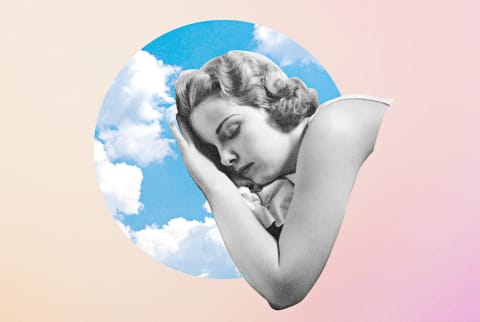According to the National Sleep Foundation, “good” sleep quality means falling asleep within about 30 minutes, staying sound asleep throughout the night with a maximum of one mid-sleep wakeup, and being able to drift back to sleep within 20 minutes of that one awakening. Unfortunately, blue light can be tough to avoid unless you’re making a conscious effort to sidestep it, considering that our computers, smartphones, and all kinds of other electronic devices emit it. However, there are ways to minimize the effects of blue light without completely giving up on electronics altogether: Turning electronics off before bed, investing in a pair of blue-blocking glasses2, and installing blue-light-reducing apps on your phone and computer can help too. So, how can you create a new narrative around sleep? “During the daytime, when you’re not trying to go to sleep, write out your thoughts about sleep and how those thoughts make you feel,” Albina says. “Ask yourself if that’s the way you want to keep feeling. If not, then you get to do thought work about it and ask yourself how you want to feel when you’re trying to fall asleep and choose different thoughts.” Studies have shown that daytime naps can hinder performance on certain mental tasks7 and increase sleepiness7 during the day. Every person has unique needs when it comes to naps and sleep, but if you’re finding that your nighttime rest is compromised, consider cutting daylight naps and see if that helps you get more sleep at night. Because caffeine stays in your system8 for several hours, you may want to stop drinking caffeinated beverages at least six hours before bedtime (so if you’re trying to snooze at 10 p.m., have your last cup no later than 4 p.m., or cut yourself off earlier if sleep is a real issue). “Alcohol can make you feel like you’re sleeping deeper, but it can cause problems with sleep architecture, namely affecting the second half of sleep, meaning you spend less time in REM,” Albina says. If you’re having trouble getting enough good-quality sleep, consider avoiding alcohol altogether. As part of the circadian rhythm, your body temperature naturally drops before bed11. Having a cool room can kick-start that process. In fact, “There’s at least 400 times more melatonin13 that comes from the gut than from the pineal gland in your brain,” Albina says. “Not taking in blue light through your eyes is an important way to maintain healthy melatonin levels, but healing your gut is just as important14 and could be even more impactful when it comes to getting better sleep.” Gut health is a complex topic to tackle alone, so make sure to work with a specialist who can help guide you through any necessary testing, supplementation, and/or medication. But when it’s time for bed, Albina says total darkness is absolutely essential. “Our eyes pick up even the least bit of light as a signal to delay sleep,” she explains. “Wear an eye mask and get blackout curtains if you live in a city or have a streetlight outside your bedroom.” So as much as possible, try to stick to the same bedtimes and wake-up times—even on the weekends. But for some individuals, snacking before bed can actually help them snooze. “When your diet contains a lot of carbs or sugar, including things like soda, your body can get on a blood sugar roller coaster—this can lead your blood sugar to plummet overnight, spiking your cortisol,” Albina says. Holistic psychiatrist Ellen Vora, M.D., agrees, adding, “When your blood sugar crashes in the middle of the night, the resulting stress response disrupts your sleep.” If you are waking up in the middle of the night feeling stressed or panicky, try a blood-sugar-balancing snack before bed and again if you wake up in the middle of the night. Vora suggests a spoonful of coconut oil. If you’ve been sleeping on the same mattress for more than a decade, or your sheets and pillows are ancient and in need of an upgrade, consider investing in some comfy, cozy accoutrements for better rest. According to the National Sleep Foundation, “Lying in bed awake can create an unhealthy link between your sleeping environment and wakefulness.” Do what you can to make your bedroom a true sleep sanctuary by reserving it for rest, intimacy, and relaxation—nothing else. Recent research23 indicates that evening exercise doesn’t necessarily mean sleepless nights, but every person is different, so if you’re having trouble winding down after your workouts, consider hitting the gym in the a.m. She’s also a contributing editor at California Home Design.




